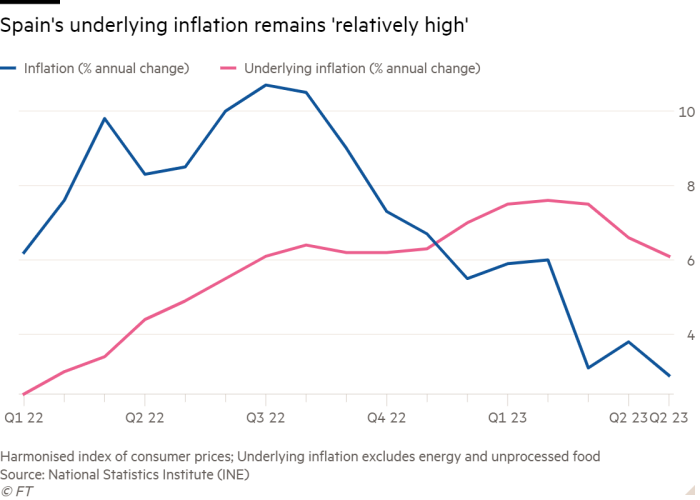Nato foreign ministers to debate Ukraine’s alliance accession
This article is an on-site version of our Europe Express newsletter. Sign up here to get the newsletter sent straight to your inbox every weekday and Saturday morning
Good morning. Violent unrest in Kosovo has gone from bad to worse, with Nato sending in an extra 700 peacekeeping troops after dozens were injured (and three were shot) and the US rebuking Pristina with punitive measures.
Today, our man in Oslo tells us what to expect from a two-day gathering of Nato foreign ministers in the Norwegian capital, while our agriculture and environment correspondents take stock of how climate change has battered Europe’s farmers.
Joining the club
Nato has kept remarkable unity in the 15 months since Russia’s full-scale invasion of Ukraine. But today and tomorrow in Oslo, Nato foreign ministers will confront head-on a topic where they are deeply divided: how soon they can promise Ukraine a road map to join the alliance, writes Richard Milne.
Context: Eastern European countries want Kyiv in Nato as quickly as possible, arguing it has proved itself on the battlefield as the first line of defence for the continent, while many western nations want to proceed more cautiously, fearful of Russian retaliation.
Nato secretary-general Jens Stoltenberg conceded yesterday that allies were split on the precise timetable and tools needed to get Ukraine into the alliance. But he argued there was unity over the more acute matter of giving Kyiv military and economic support now.
Much depends on the stance of the US, and whether or not the pro-membership camp led by the UK, Poland and the Baltic states is able to convince Washington to lean more towards their more ambitious timetable.
Oslo is part of a well-choreographed build-up to the full summit in Vilnius on July 11-12. Stoltenberg highlighted two other big issues to be discussed by the 31 members and invitee Sweden: ensuring all countries spend at least 2 per cent of GDP on defence, and dealing with the rise of China.
But there are plenty of other issues, including ending Turkish opposition to Sweden joining Nato, and the matter of who might succeed Stoltenberg himself as secretary-general. Mette Frederiksen, Denmark’s prime minister, did her chances no harm by yesterday promising to meet the 2 per cent goal, albeit only through increased military aid to Ukraine.
As an aside, Stoltenberg yesterday also issued a warning to those in the EU who are keen to boost the bloc’s own defence aspirations at the possible expense of Nato.
“If you are afraid that the US will elect a president who isn’t as affectionate for Nato as the current president, so you should be careful not to create a rhetoric, a perception that Europe can manage on its own. Because then you play into the hands of those forces,” Stoltenberg said.
Chart du jour: Low point

Spanish inflation has surprisingly fallen to 2.9 per cent, its lowest in almost two years, as fuel prices dropped. This has boosted economists’ hopes that inflation in the wider eurozone could ease.
Stark reminder
As EU member states and lawmakers are increasingly pushing back against green legislation, climate change is already hitting European farmers hard, write Andy Bounds and Alice Hancock.
Context: Flash floods have ruined crops in Italy while drought is threatening France, Italy, Spain and Portugal. Meanwhile, EU legislation to make agriculture more sustainable and reduce its carbon emissions has remained stuck in negotiations, as critics fear the cost to farmers.
“The recent and ongoing geopolitical crisis, as well as adverse weather conditions, such as severe floods, animal and plant disease and droughts in parts of Europe have reminded us of the increased fragility of the European agriculture sector,” Portugal and the other three affected countries said in a document presented at the agriculture ministers’ meeting yesterday.
They also asked Brussels to consider using money from the EU budget’s agricultural reserve and allow early payment of subsidies to help out.
Meanwhile, many of the ministers showing sympathy have been pushing to block EU legislation to help fight climate change, including measures to rewild the landscape, reduce pesticide use and slash emissions from livestock.
Virginijus Sinkevičius, the environment commissioner responsible for those measures, says they are the only way to ensure long-term food security. “We don’t have a choice. We need to change,” he told the FT.
Solutions such as crop rotation or using plants that require less water “have been talked about for quite a while”, he said, but there is a “real shortage” of action.
“You need to have those solutions in advance before it’s too late”, Sinkevičius warned.
With the effects of climate change already visible — and upcoming EU elections limiting what legislation can still be pushed through — it may already be so.
What to watch today
-
First day of Nato foreign affairs ministers meeting in Oslo.
-
Dutch premier Mark Rutte hosts his Polish colleague Mateusz Morawiecki in The Hague.
Now read these
Are you enjoying Europe Express? Sign up here to have it delivered straight to your inbox every workday at 7am CET and on Saturdays at noon CET. Do tell us what you think, we love to hear from you: europe.express@ft.com. Keep up with the latest European stories @FT Europe